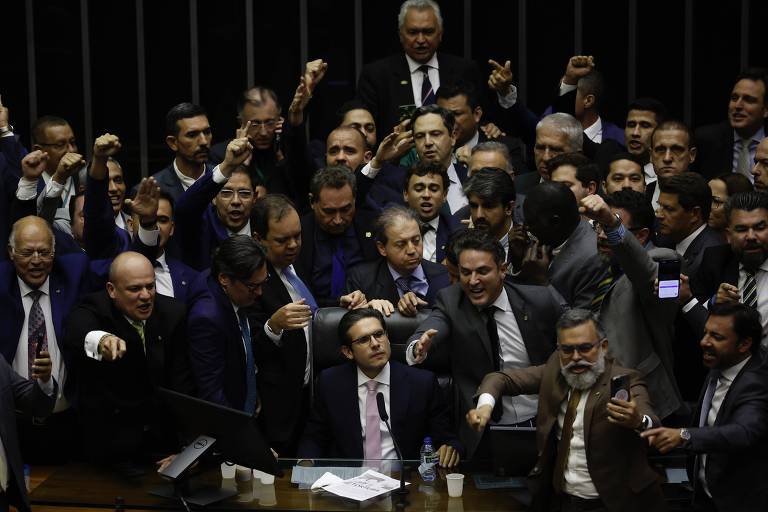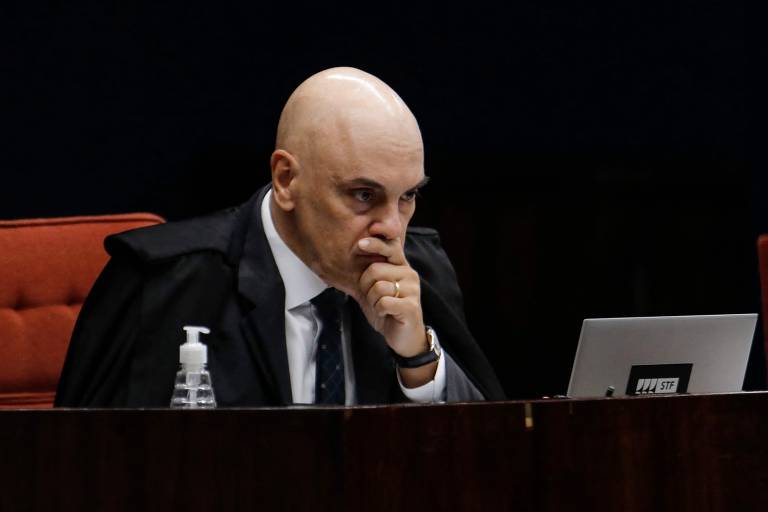Bolsonaro's mutiny makes the Chamber unviable for 30 hours, and Motta only manages to open the session after Lira intervenes.

Congressman Hugo Motta ( Republicans -PB) only managed to return to the presidency table of the Chamber on Wednesday night (6) after long negotiations with the opposition mediated by his predecessor, Arthur Lira (PP-AL).
The pro-Bolsonaro riot in reaction to the house arrest of former President Jair Bolsonaro ( PL ) made it impossible for the House's plenary to function for 30 hours.
In the movement, opposition parliamentarians occupied the tables of the plenary sessions of the Chamber and Senate on Tuesday (5) , preventing sessions from taking place. In a rotation scheme, they spent the night at the site , which was isolated by the legislative police, with only parliamentarians allowed to enter.
With the mutiny, Bolsonaro supporters sought to pressure the leadership of Congress to consider amnesty for the former president and the participants of January 8th, in addition to the impeachment of STF (Supreme Federal Court) minister Alexandre de Moraes , who ordered the arrest, and restrictions on the court's actions, especially in relation to investigations and proceedings against parliamentarians.

Motta and the president of the Senate , Davi Alcolumbre ( União Brasil -AP), spent the day meeting with the PL and other parties in an attempt to reach an agreement to vacate the voting plenaries, but negotiations stalled.
Supported by leaders of 17 parties, including the pro-government party, the Speaker of the House announced that he would open the plenary session at 8:30 p.m. this Wednesday, which only occurred after 10 p.m., following Lira's intervention . The understanding was that Motta should sit in his chair and that any negotiations with the Bolsonaro supporters could not take place under the pretext of occupying the plenary.
To regain control, Motta even threatened to suspend Bolsonaro supporters from office for six months—a Chamber statement released shortly before the session stated that any representatives who attempted to impede the proceedings would be subject to this punishment. Ultimately, he adopted a conciliatory tone, seeking to strengthen Parliament and its capacity for dialogue.
When he managed to open the session, amid shouts of "amnesty now" and "no amnesty," Motta spoke for about ten minutes and then closed the session. The president stated that his presence was intended to guarantee "the respectability of this panel, which is non-negotiable."
"We've had a series of recent events that have brought us to this feeling of turmoil. Is it common? No? Are we living in normal times? No, no. But it's precisely at this time that we cannot negotiate our democracy," he said.
He further stated that "the country must always come first" and that "individual projects" cannot come before the people. "What happened in this House was not good, it was not consistent with our history. [...] What happened yesterday and today cannot be bigger than the plenary session," he added.
Motta avoided taking sides in the dispute, but he was applauded more by the government than by the opposition. "I'm not here to please either side, to be complicit with either agenda," he said.
PL leader Sóstenes Cavalcante (RJ) stated after the session that the opposition had secured a compromise that amnesty for those accused of coup plotting and the end of special jurisdiction would be put to a vote, which was a requirement for the floor to be cleared . According to pro-Bolsonaro deputies, leaders of other parties, such as the PP and União Brasil, agreed to table the matter.
Government deputies, however, claim that this entire imbroglio highlighted the isolation of Bolsonarism in the House , as there was a consensus among leaders of at least 17 parties that the plenary session should be resumed and that proposals would not be discussed under blackmail.
To sit in his chair, Motta left his office, which is next to the plenary, and took more than six minutes to cross the sea of Bolsonaro deputies around the table.
He even walked back to his office after getting close to the chair and it was refused by Representative Marcel van Hattem (Novo-RS). After much conversation and pushing, he was practically dragged back to the chair by Representative Isnaldo Bulhões Jr. (AL), leader of the MDB caucus.
During the afternoon, just before meeting with party leaders, Motta met with opposition leaders, Congressman Zucco (PL-RS), and with the leader of the PL, Sóstenes Cavalcante (RJ), in an attempt to get the Bolsonarists to end the protest, but there was no agreement.
According to PL parliamentarians, Sóstenes and Zucco withdrew after Motta said he would not put the amnesty bill for those convicted of the coup acts of January 8, 2023, to a vote.
Upon leaving the leaders' meeting with Motta, Workers' Party leader Lindbergh Farias (RJ) praised the president's decision to call tonight's session . "It's unacceptable to call this a violent attempt to halt parliamentary activity. So there was a very strong reaction; we congratulate the Speaker of the House. And there was a united stance among the leadership group, which stated that normalcy must be restored. This blackmail will be met with a fitting response," he added.
In the Senate, Alcolumbre announced early in the evening that he will hold a virtual session this Thursday (7).
"I will not accept intimidation or attempts to embarrass the Senate Presidency. The Parliament will not be held hostage by actions aimed at destabilizing its functioning. We will continue to vote on matters of public interest, such as the bill that guarantees income tax exemption for millions of Brazilians who earn up to two minimum wages. Democracy is built on dialogue, but also on responsibility and firmness," Alcolumbre said in a statement.
Alcolumbre's meeting with political party leaders ended early in the evening, and he then continued talking to the opposition in isolation.
According to reports, he obtained the support of other parties to hold in-person sessions in the House starting next week and stated that he would rule out voting on the impeachment of a Supreme Court minister, one of the main banners of Bolsonarism .
"Next week, what I heard from the president is that he will not accept [obstruction], it's like saying 'for better or worse, next week the plenary has to be free'," said Senator Cid Gomes (PDT-CE).
According to the senator, just as Motta indicated, Alcolumbre's stance is also one of not giving in.
"The president said that the issue of impeachment [of a Supreme Court justice] is his responsibility, his prerogative. The presidency of the Senate. To use his words, 'there is no way I will put this matter to a vote,'" added Cid.
"And a request made by, with all due respect, the São Paulo garbage collectors' association is all the same as the signatures of 80 senators. The process has nothing to do with the Senate quorum. He made it clear that this movement to seek signatures will not influence his decision."
uol







